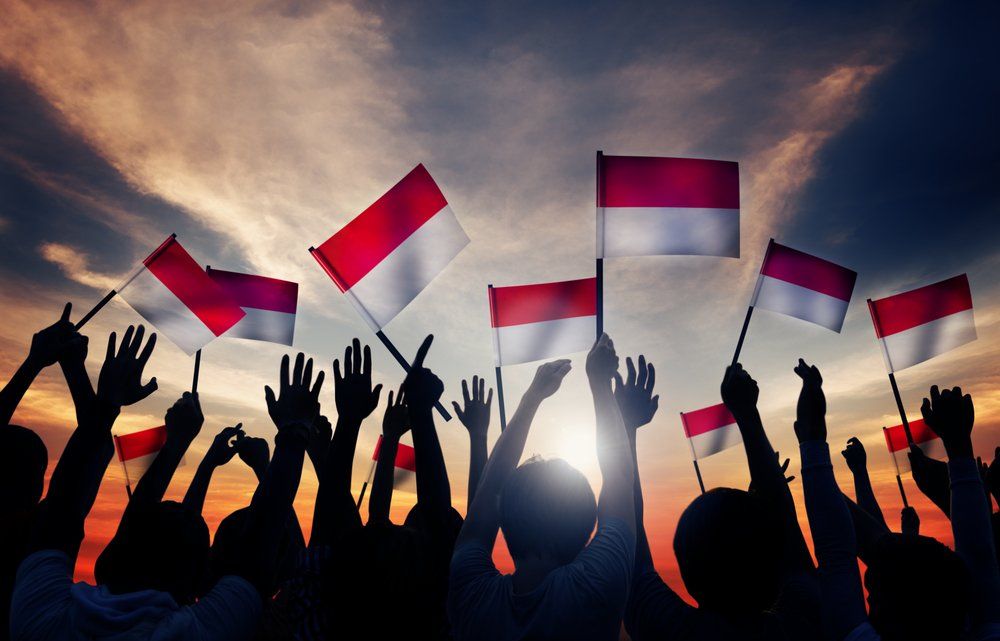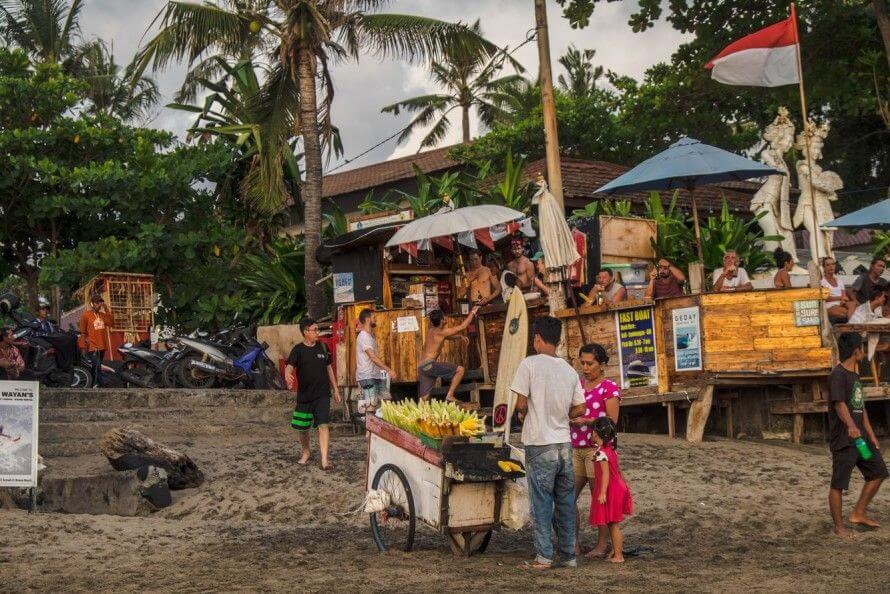The official language of Bali is the bahasa of Indonesia, which is known as also as Indonesian, although its use is shared with the Balinese language and many of its citizens speak English, particularly in shops, hotels and restaurants.
The Balinese language, is a language that has a Polynesian and Malay origin , spoken by all the inhabitants of the island, although the great majority dominates the English to perfection and other languages.

How do the Balinese speak?
The Balinese speak the Balinese language, which is of Polynesian and Malay origin, and also speak Bahasa Indonesian, and also English, mostly in the tourist areas, and some of its inhabitants speak Spanish, German and English.
Bali with its capital Denpasar has an extension of 5.636 Km2 and has 3 and a half million inhabitants and it is the capital that has the biggest amount of inhabitants, a place that has a pleasant climate during the whole year with a temperature that varies between 20º and 33° C.
The island of Bali is a tourist place thanks to its incredible landscapes, to the wealth of its culture, and its high temperatures throughout the year, with a dry season and another rainy one.

Words in Balinese Language
Here is a series of words that will be of great help to you in Bali:
Greetings in Balinese
- Good morning = Selamat pagi (s’lah-mawt pag-jee)Good morning = Selamat siang (s’lah-mawt see-ung)Good afternoon = Selamat sore (s’lah-mawt sore- Good night = Selamat malam (s’lah-mawt maw-lahm)Goodbye (to a person leaving) = Selamat Jalan (s’lah-mawt jah-lahn)Goodbye (if you are the person leaving) = Selamat tinggal (s’lah-mawt ting-gahl)How are you? = Apa Kabar (up-ah kah-barr)I’m great = baik baik (bicycle-bike)
- Good morning = Selamat pagi (s’lah-mawt pag-jee)Good morning = Selamat siang (s’lah-mawt see-ung)Good afternoon = Selamat sore (s’lah- mawt sore-eh)Good night = Selamat malam (s’lah-mawt maw-lahm)Goodbye (to a person leaving) = Selamat Jalan (s’lah-mawt jah-lahn)Goodbye (if you are the person leaving) = Selamat tinggal (s’lah-mawt ting-gahl)How are you? = Apa Kabar (up-ah kah-barr)I’m great = baik baik (bicycle-bike)
- Good morning = Selamat pagi (s’lah-mawt pag-jee)
- Good morning = Selamat siang (s’lah-mawt see-ung)
- Good afternoon = Selamat sore (s’lah-mawt sore- (eh)
- Good night = Selamat malam (s’lah-mawt maw-lahm)
- Goodbye (if you are the person leaving) = Selamat Jalan (s’lah-mawt jah-lahn)
- Goodbye (if you are the person leaving) = Selamat tinggal (s’lah-mawt ting-gahl)
- How are you? = Apa Kabar (up-ah kah-barr)
- I’m great = baik baik (bicycle-bike)
- Good morning = Selamat pagi (s’lah-mawt pag-jee)Good morning = Selamat siang (s’lah-mawt see-ung)Good afternoon = Selamat sore (s’lah- mawt sore-eh)Good night = Selamat malam (s’lah-mawt maw-lahm)Goodbye (to a person leaving) = Selamat Jalan (s’lah-mawt jah-lahn)Goodbye (if you are the person leaving) = Selamat tinggal (s’lah-mawt ting-gahl)How are you? = Apa Kabar (up-ah kah-barr)I’m great = baik baik (bicycle-bike)
- Good morning = Selamat pagi (s’lah-mawt pag-jee)
- Good morning = Selamat siang (s’lah-mawt see-ung)
- Good afternoon = Selamat sore (s’lah-mawt sore- (eh)
- Good night = Selamat malam (s’lah-mawt maw-lahm)
- Goodbye (if you are the person leaving) = Selamat Jalan (s’lah-mawt jah-lahn)
- Goodbye (if you are the person leaving) = Selamat tinggal (s’lah-mawt ting-gahl)
- How are you? = Apa Kabar (up-ah kah-barr)
- I’m great = baik baik (bicycle-bike)
- Good morning = Selamat pagi (s’lah- mawt pag-jee)
- Good morning = Selamat siang (s’lah-mawt see-ung)
- Good afternoon = Selamat sore (s’lah-mawt sore- (eh)
- Good night = Selamat malam (s’lah-mawt maw-lahm)
- Goodbye (if you are the person leaving) = Selamat Jalan (s’lah-mawt jah-lahn)
- Goodbye (if you are the person leaving) = Selamat tinggal (s’lah-mawt ting-gahl)
- How are you? = Apa Kabar (up-ah kah-barr)
- I’m great = baik baik (bicycle-bike)
Balinese Pronouns
- I = Saya (sigh-ah)You = Anda (awn-da)You (sir, a grown man) = Pak (puck)You (ma’am to adult women) = Ibu (ee-boo)He/she = Dia (dee-ah)We = kita (kee-tah)They = Mereka (ma-reck-ah)
- I = Saya (sigh-ah)You = Anda (awn-da)You (sir, to adult man) = Pak (puck)You (madam, to adult women) = Ibu (ee-boo)He/sh», «(k’nahp-ah)What? Bagaimana?(bug-eye-mah-nah)How many? Berapa?(burr-ah-pah)How much is this? Berapa ini?(burr-ah-pah in-ee)How much is that? Barapa itu?(burr-ah-pah-ee-ee-too)How long?(time) = Berapa lama? (burr-ah-pah lah-mah) How far? Berapa jauh? (burr-ah-pah jow-ooh) Keep old? Berapa umur? (burr-ah-pah oo-more)
- Who? Siapa? (see-up-ah) What? Pa? (up-ah) When? Kapan? (Kah-pahn) Where?», «Kemana? (k’mah-nah) Why? Kenapa? (k’nahp-ah) What? Bagaimana? (bug-eye-mah-nah) How many? Berapa? (burr-ah-pah) How much is this? Berapa ini? (burr-ah-pah in-ee) How much is that? Barapa itu? (burr-ah-pah-ee-ee-too) How long? (time) = Berapa lama? (burr-ah-pah lah-mah) How far? Berapa jauh? (burr-ah-pah jow-ooh) Stay old? Berapa umur? (burr-ah-pah oo-more)
- Who? Siapa? (see-up-ah)
- What? Siapa?», «(up-ah)
- When? Kapan? (Kah-pahn)
- Where? Kemana? (k’mah-nah)
- Why? Kenapa? (k’nahp-ah)
- What? Bagaimana? (bug-eye-mah-nah)
- How many? Berapa? (burr-ah-pah)
- How much is this? Berapa ini? (burr-ah-pah in-ee)
- How much is that? Barapa itu? (burr-ah-pah-ee-ee-too)
- How long? (burr-ah-pah lah-mah)
- How far away? (burr-ah-pah jow-ooh)
- Keep old? (burr-ah-pah oo-more)
- Who?», «Siapa? (see-up-ah) What? Appa? (up-ah) When? Kapan? (kah-pahn) Where? Kemana? (k’mah-nah) Why? Kenapa? (k’nahp-ah) How? Bagaimana? (bug-eye-mah-nah) How many? Berapa? (burr-ah-pah) How much is this? Berapa ini? (burr-ah-pah in-ee) How much is that? Barapa itu? (burr-ah-pah-ee-ee-too) How long? (time) = Berapa lama? (burr-ah-pah lah-mah) How far? Berapa jauh?», «(burr-ah-pah jow-ooh) Keep it old? (burr-ah-pah oo-more)
- Who? (see-up-ah)
- What? Apa?(up-ah)
- When? Kapan?(Kah-pahn)
- Where? Kemana?(k’mah-nah)
- Why? Kenapa? (k’nahp-ah)
- What? Bagaimana? (bug-eye-mah-nah)
- How many? Berapa? (burr-ah-pah)
- How much is this? Berapa ini?(burr-ah-pah in-ee)
- How much is that? Barapa itu?(burr-ah-pah-ee-ee-too)
- How long?», «(time) = Berapa lama?(burr-ah-pah lah-mah)
- How far away?(burr-ah-pah jow-ooh)
- Stay old? Berapa umur?(burr-ah-pah oo-more)
- Who?(see-up-ah)
- What? (up-ah)
- When? Kapan?(Kah-pahn)
- Where? Kemana?(k’mah-nah)
- Why? Kenapa? (k’nahp-ah)
- What? Bagaimana? (bug-eye-mah-nah)
- How many? Berapa? (burr-ah-pah)
- How much is this? Berapa ini?», ‘(burr-ah-pah in-ee)
- How much is that?(burr-ah-pah-ee-ee-too)
- How long?(time) = Berapa lama?(burr-ah-pah lah-mah)
- How far? Berapa jauh?(burr-ah-pah jow-ooh)
- Keep old?(burr-ah-pah oo-more)
Manners
- Please (may I have? )= Minta (min-tah)Please (help me) = Tolong (toe)Thank you = Terima Kasih (tehree-mah kah-see)You are welcome = Sama Sama (saw-ma saw-ma saw-ma)Sorry = Saya minta ma\’af (sigh-ah min-tah mah-uff)
- Please (may I have? )= Minta (min-tah)Please (help me) = Tolong (toe)Thank you = Terima Kasih (tehree-mah kah-see)You are welcome = Sama Sama (saw-ma saw-ma saw-ma)Sorry = Saya minta ma\’af (sigh-ah min-tah mah-uff)
- Please (may I have? )= Minta (min-tah)
- Please (help me) = Tolong (toe)
- Thank you = Terima Kasih (tehree-mah kah-see)
- You are welcome = Sama Sama (saw- ma saw-ma saw-ma)
- Sorry = Saya minta ma\’af (sigh-ah min-tah mah-uff)
- Please (may I have? )= Minta (min-tah)Please (help me) = Tolong (toe)Thank you = Terima Kasih (tehree-mah kah-see)You are welcome = Sama Sama (saw-ma saw-ma saw-ma)Sorry = Saya minta ma\’af (sigh-ah min-tah mah-uff)
- Please (may I have? )= Minta (min-tah)
- Please (help me) = Tolong (toe)
- Thank you = Terima Kasih (tehree-mah kah-see)
- You are welcome = Sama Sama (saw- ma saw-ma saw-ma)
- Sorry = Saya minta ma\’af (sigh-ah min-tah mah-uff)
- Please (may I have? )= Minta (min-tah)
- Please (help me) = Tolong (toe)
- Thank you = Terima Kasih (tehree-mah kah-see)
- You are welcome = Sama Sama (saw-ma saw-ma saw- ma)
- Sorry = Saya minta ma\’af (sigh-ah min-tah mah-uff)
Useful words
- Good = Bagus (bah-goos)Very good = Bagus sekali (bah- goos s\’kahlee)Not good = Tidak bagus (tee-duck bah-goos)Fine = Baik (bicycle)Yes = Ya (yawning)No = Tidak (tee-duck)How = Suka (soo-kah)I don\’t like = Tidak Suka (tee-duck soo-kah_)I want = Mau (mao)I don\’t want (Tidak mau) (tee- duck mao)
- Good = Bagus (bah-goos)Very good = Bagus sekali (bah-goos s\’kahlee)Not good = Tidak bagus (tee-duck bah-goos)Fine = Baik (bike)Yes = Ya (yaw)No = Tidak (tee- duck)How = Suka (soo-kah)I don\’t like = Tidak Suka (tee-duck soo-kah_)I want = Mau (mao)I don\’t want (Tidak mau) (tee-duck mao)
- Good = Bagus (bah-goos)
- Very good = Bagus sekali (bah- goos s\’kahlee)
- Not good = Tidak bagus (tee-duck bah-goos)
- Fine = Baik (bicycle)
- Yes = Ya (yaw)
- No = Tidak (tee-duck)
- How = Suka (soo- kah)
- I don\’t like = Tidak Suka (tee-duck soo-kah_)
- I want = Mau (mao)
- I don\’t want (Tidak mau) (tee-duck mao)
- Good = Bagus (bah- goos)Very good = Bagus sekali (bah-goos s\’kahlee)Not good = Tidak bagus (tee-duck bah-goos)Fine = Baik (bicycle)Yes = Ya (yawning)No = Tidak (tee-duck)How = Suka (soo-kah)I don\’t like it = Tidak Suka (tee- duck soo-kah_)I want = Mau (mao)I don\’t want (tidak mau) (tee-duck mao)
- Good = Bagus (bah-goos)
- Very good = Bagus sekali (bah-goos s\’kahlee)
- Not good = Tidak bagus (tee- duck bah-goos)
- Fine = Baik (bicycle)
- Yes = Ya (yaw)
- No = Tidak (tee-duck)
- How = Suka (soo-kah)
- I don\’t like = Tidak Suka (tee- duck soo-kah_)
- I want = Mau (mao)
- I don\’t want (Tidak mau) (tee-duck mao)
- Good = Bagus (bah-goos)
- Very good = Bagus sekali (bah- goos s\’kahlee)
- Not good = Tidak bagus (tee-duck bah-goos)
- Fine = Baik (bicycle)
- Yes = Ya (yaw)
- No = Tidak (tee-duck)
- How = Suka (soo- (kah)
- I don\’t like = Tidak Suka (tee-duck soo-kah_)
- I want = Mau (mao)
- I don\’t want (Tidak mau) (tee-duck mao)
Family
- Family = Keluarga (k\’loo- ah-ga)Family = Relative (fa-mee-lee)Friend = Kawan (kah-wahn)Lover = Kekasih (K\’kah-see)Married = Nikah (nik-ah)Husband = Suami (Swah-mee)Wife = Isteri (Is-t\’ree)Father = Bapak (Bah- puck)Mother = Ibu (Ee-boo)Grandmother = Nenek (neh-neck)Grandpa = Kakek (kah-keck)Son = Anak laki (ah-nuck lucky)Daughter = Anak perempuan (ah-nuck purom-pwan)Boy = Anak (ah-nuck)Big brother = Abang (ah- bahng)Big sister = Kakak (kah=kak)Little brother = Adik (ah-dick)Uncle = Paman (pah-mahn)Aunt = Bibi (bee-mahn)Cousin = Misan (mee-sahn)Nephew = Keponakan (k\’paw-nahk-ahn)
- Family = Keluarga (k\’lo
Post a Comment


